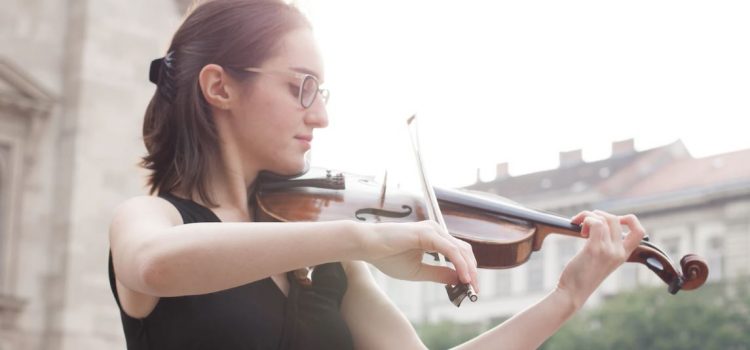
This is a free excerpt from one of Shortform’s Articles. We give you all the important information you need to know about current events and more.
Don't miss out on the whole story. Sign up for a free trial here .
Why are younger generations suddenly listening to classical music again? How do millennials and Gen Z discover new music?
Classical music is gaining surprising ground with millennials and with Gen Z. What used to be a genre reserved for those over 50 is now making its way to listeners under 35—and streaming platforms are influencing this behavior.
Below, we’ll explore why the popularity of classical music is rising and what role streaming apps have to play.
What’s Bringing Younger Listeners to Classical Music?
Many people think of classical music as the stuffiest, most old-fashioned kind of music. Juilliard-trained violinist Arianna Warsaw-Fan Rausch notes that the symphony and the opera have long had a snobby reputation. But she contends that classical music isn’t for snobs, and the recent rise in popularity of classical music is proving her right.
Experts say that a new generation of listeners is crossing the divide between popular music and classical music and trying some Beethoven or Mozart alongside their favorite tracks by Taylor Swift or Drake. By some estimates, as many as 35% of American adults listen to classical music, and nearly a third of current classical music listeners are under age 35.
How Do Gen Z and Millennials Discover Music?
Modern media—and social media—have changed how younger listeners discover music. TikTok launched the hashtag late in 2022 with a guest playlist curated by Hans Zimmer (a German composer who’s written music for more than 100 films, from The Lion King to The Dark Knight) and a live performance by Lang Lang, a classical pianist who has more than 250,000 followers on TikTok.
Many younger listeners first seek out classical music because of their appreciation for the soundtracks of their favorite films, often those scored by Zimmer, John Williams, or Ennio Morricone. The soundtracks of video games are now having the same effect. Some listeners say they’ve fallen in love with classical music thanks to their favorite games.
Younger audiences are also finding a new interest in classical music through favorite musicians like Lizzo, who is a classically trained flutist. Additionally, classical violinists Lindsey Stirling and Charlie Siem and pianist Lang Lang are credited with interesting younger audiences in listening to or even playing classical music.
Where Do Younger Generations Listen to Music?
Music streaming apps—like Spotify and Apple Music—are popular among Gen Z and millennial listeners. These apps have also been credited with bringing younger listeners to classical music. Apple even recently launched a streaming app focused specifically on the genre, called Apple Music Classical.
In a phenomenon that observers call “playlist culture,” streaming services have been nudging users to listen to playlists—curated by either humans or algorithms to match every mood and moment of the day. Users have been following these nudges, and the change in behavior enables streaming services to exert a surprising amount of control over what music users discover.
Sometimes, this includes classical music, as with Spotify’s “Calming Classical” playlist, which has more than 700,000 likes on the platform. However, critics note that hours-long playlists promote treating tracks and artists as interchangeable. This might not be conducive to really connecting with new music. Some critics also worry that it might be pushing artists to create music that’s ignorable rather than interesting. But there are some signs that listeners are tuning in to the classical tracks on their playlists, not tuning them out. Spotify users create their own playlists with titles like, “Classical music that makes you feel like a villain in the 19th century.”
Why Classical Music? Why Now?
The youngest members of Gen Z are still enrolled in K-12 schools, and many students become interested in classical music through school programs. But many school districts have cut or are considering cutting music education. Research also suggests that schools that primarily serve white students offer significantly more music education opportunities than schools in the same metropolitan area that primarily serve students of color.
However, advocates have taken on the mission of making the genre more accessible and approachable: Orchestras are diversifying their audiences, their ensembles, and their repertoires. Many have sought to expand the music they play beyond the traditional canon of white male composers, taking up works by composers traditionally underrepresented in the classical music world, such as women and people of color.
Gen Z musicians note that they didn’t grow up shopping for CDs: Instead, they’ve learned to check out what’s trending on TikTok or listen to Spotify playlists curated to a specific mood. The mood they’re experiencing right now might be well-suited to a soundtrack of classical music. If younger listeners want music to relax or cry to—relatable to music fans of all ages—then classical music can offer them that, too.

Want to fast-track your learning? With Shortform, you’ll gain insights you won't find anywhere else .
Here's what you’ll get when you sign up for Shortform :
- Complicated ideas explained in simple and concise ways
- Smart analysis that connects what you’re reading to other key concepts
- Writing with zero fluff because we know how important your time is






